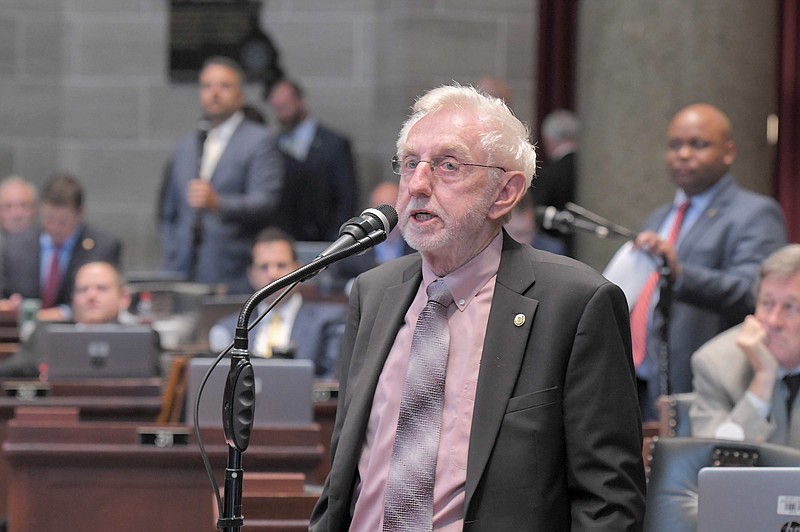Parents were passionate and, at times, tearful as they testified Tuesday on a variety of issues concerning their children with disabilities in front of the Missouri House Committee on Elementary and Secondary Education.
Rep. Hannah Kelly, R-Mountain Grove, presented on HB 2095.
"House Bill 2095 deals with the fact that currently, the law allows local school districts to investigate reports made to the hotline for child abuse involving school personnel. Children's division is only allowed to investigate these reports if they involve sexual abuse or if the local school district decides not to investigate on its own," Kelly said. "This bill would allow the children's division to investigate all hotline reports involving school personnel regardless if the report involves sexual or physical abuse. The local school districts would no longer be allowed to conduct internal investigations."
Rep. Maggie Nurrenbern, D-Kansas City, pointed out something else she'd like added to the bill:
"As I was looking through this and trying to figure out what your language would do, I was pretty shocked to see ... that our school personnel can still spank children in their schools. Did you know that, lady?" she asked Kelly.
Kelly responded that she did, and she was happy to have a conversation about addressing that, but said she did not want to amend her bill because she worried that with additional amendments she might see "the ship sink" and the bill fail.
The hearing contained testimony from multiple parents, many of whom alleged in-school abuse of their children with disabilities and an inadequate response from school districts.
One parent, Tracy Black, said when she asked child services about a case involving her son, she was told they could not address it.
"They really surprised us when they told us that the school district gets to investigate itself when things happen in the building like this," she said.
Several witnesses pointed out the disproportionate effect on people with disabilities.
Robyn Schelp, of Missouri Disability Empowerment, said: "This bill is not a special ed bill, although if you've noticed, every parent who's testified had a child in special education. It significantly impacts students with disabilities. Children with disabilities are three times more likely to be abused than their typically- developing peers and five times more likely to be sexually abused."
"Abuse happens in our schools. Ignoring the truth and hiding abuse happens in our schools. We must have outside investigations," she said.
Missouri resident Luke Barber said he supported the bill with modifications. He said since students with disabilities can remain in school until 21, they fall under adult protective services. He thought the bill should be expanded to include child and adult services.
Rep. Travis Smith, R-Dora, also presented on a pair of bills: HB 2010 and HB 2011.
Schelp with Missouri Disability Empowerment testified on HB 2010, explaining its provisions. She said federal law requires schools provide free and appropriate public education for those with disabilities. If a parent doesn't feel the education is adequate, they must follow due process to prove that is the case. This bill would put the burden of proof on the school district, rather than parents having to prove the education doesn't meet the requirements.
Parents and advocates testified on the difficulties of navigating the special education system or pursuing due process, with testimony at times becoming emotional. Parents cited difficulty obtaining necessary documents and large legal expenses associated with pursuing a dispute.
Erin Keith, a parent of a child who uses special education services, said she had to file due process recently.
"In December, we signed an agreement, settled. By then it had cost our family $8,400, but the monetary total was nothing compared to the emotional cost and time investment. That's huge. It's now February, and we're still trying to get everything finalized from the case, so the monetary cost continues to rise as the district will only communicate through lawyers," she said.
Many of the same witnesses testified in favor of HB 2011, which would require school districts to obtain parental consent for revisions to students' Individualized Education Programs.
The committee also passed HB 1804 by Rep. Rudy Veit, R-Wardsville, and HB 1721, sponsored by Rep. Brenda Shields, R-St. Joseph. Veit's bill would allow school boards to subdivide into smaller subdistricts like city wards for elections, and Shields' bill would allow small school districts that share a superintendent to receive an additional $30,000 in state aid per year for up to five years.
Click the links below to read the full bill:
• HB 2095: Child abuse investigations at schools
Sponsor: Rep. Hannah Kelly
• HB 2010: Burden of proof
Sponsor: Rep. Travis Smith
• HB 2011: Parental consent
Sponsor: Rep. Travis Smith
• HB 1804: School board districts
Rep. Rudy Veit
• HB 1721: School district superintendents
Rep. Brenda Shields

